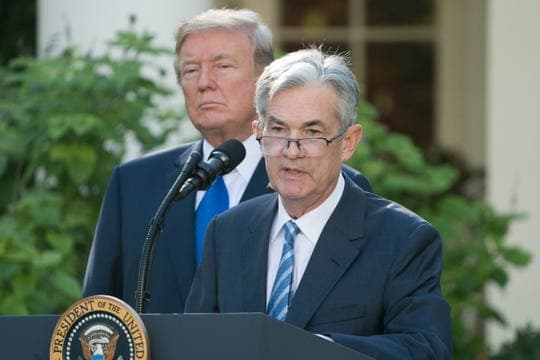
President Trump wasn’t happy with the Federal Reserve’s quarter-percentage-point rate cut Wednesday, saying Fed Chairman Jerome Powell “let us down” by not signaling further decreases.
“What the Market wanted to hear from Jay Powell and the Federal Reserve was that this was the beginning of a lengthy and aggressive rate-cutting cycle which would keep pace with China, The European Union and other countries around the world,” Trump said in a late afternoon tweet.
The Dow Jones industrial average fell 334 points Wednesday after Powell said the move wasn’t the start of a lengthy rate-cutting cycle, though he didn’t rule out future decreases. He said it would depend on whether threats to the Fed’s outlook — a sluggish global economy, Trump’s trade war with China and meager inflation – ease.
That didn’t appease Trump.
“As usual, Powell let us down, but at least he is ending quantitative tightening, which shouldn’t have started in the first place – no inflation. We are winning anyway, but I am certainly not getting much help from the Federal Reserve!”
Quantitative tightening was the Fed’s campaign to shrink its balance sheet amid an improving economy, a strategy that tended to push long-term rates higher. The Fed ended the initiative Wednesday, two months earlier than anticipated.
Trump’s tweet came as no surprise. Ahead of the Fed meeting earlier this week, Trump tweeted that the central bank “will do very little by comparison” to Europe and China.
Powell said a prolonged rate-cutting effort isn’t appropriate because the U.S. isn’t in recession.
“The performance of the economy has been really good,” he told reporters, adding the rate cut represents a bid to ward off a potential recession that could be sparked by the global and trade troubles. Economists have said such a step is prudent because if there is a recession, low rates give the Fed little room to make further cuts.
Meanwhile, policymakers in China and Europe are expected to lower interest rates later this year to combat economic slowdowns. Lower rates can boost a country’s economy by making its exports more attractive to overseas buyers, potentially sparking a currency war in which nations compete to trim rates.
Trump has repeatedly blasted Powell over the past year – first for hiking rates in 2018 and then for not reducing them more rapidly this year. Such jawboning breaks with a 25-year tradition of U.S. presidents avoiding criticizing Fed chiefs to preserve the agency’s independence.
Powell reiterated Wednesday that the Fed isn’t affected by politics.

